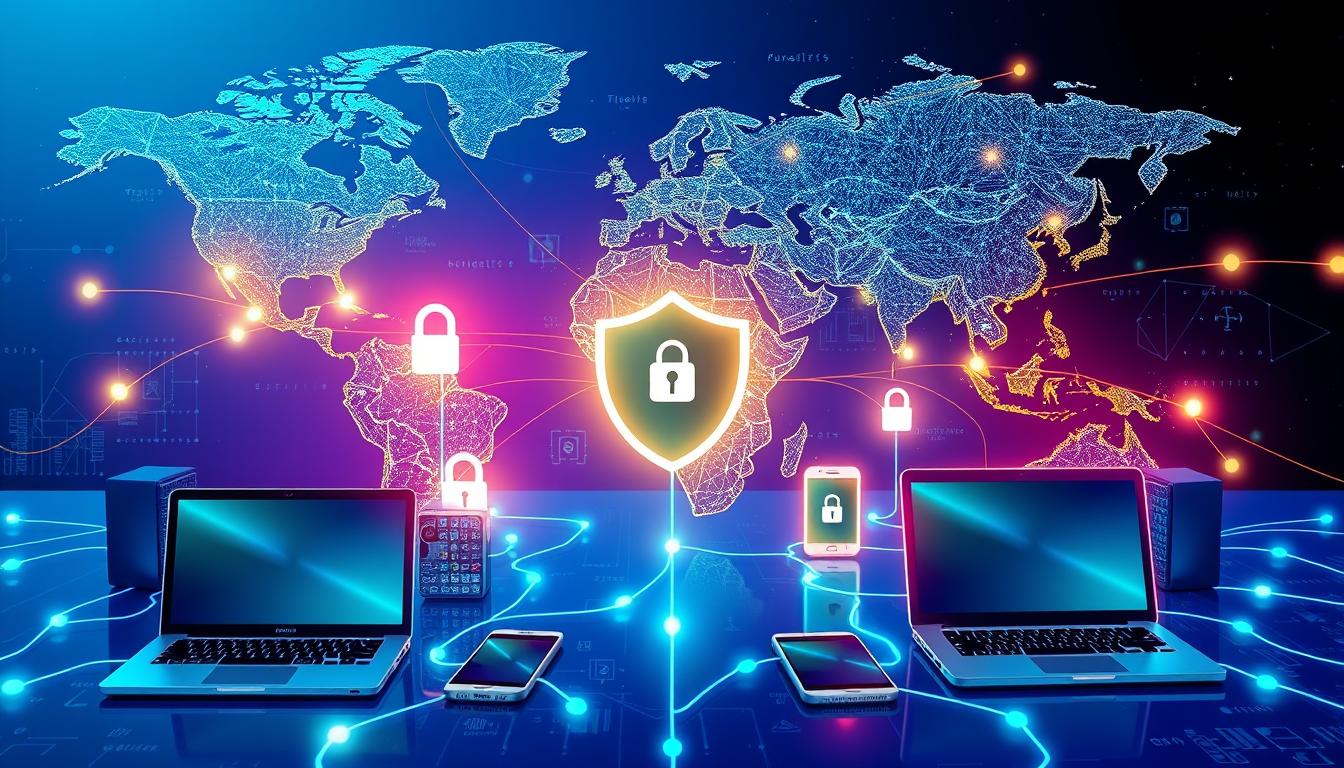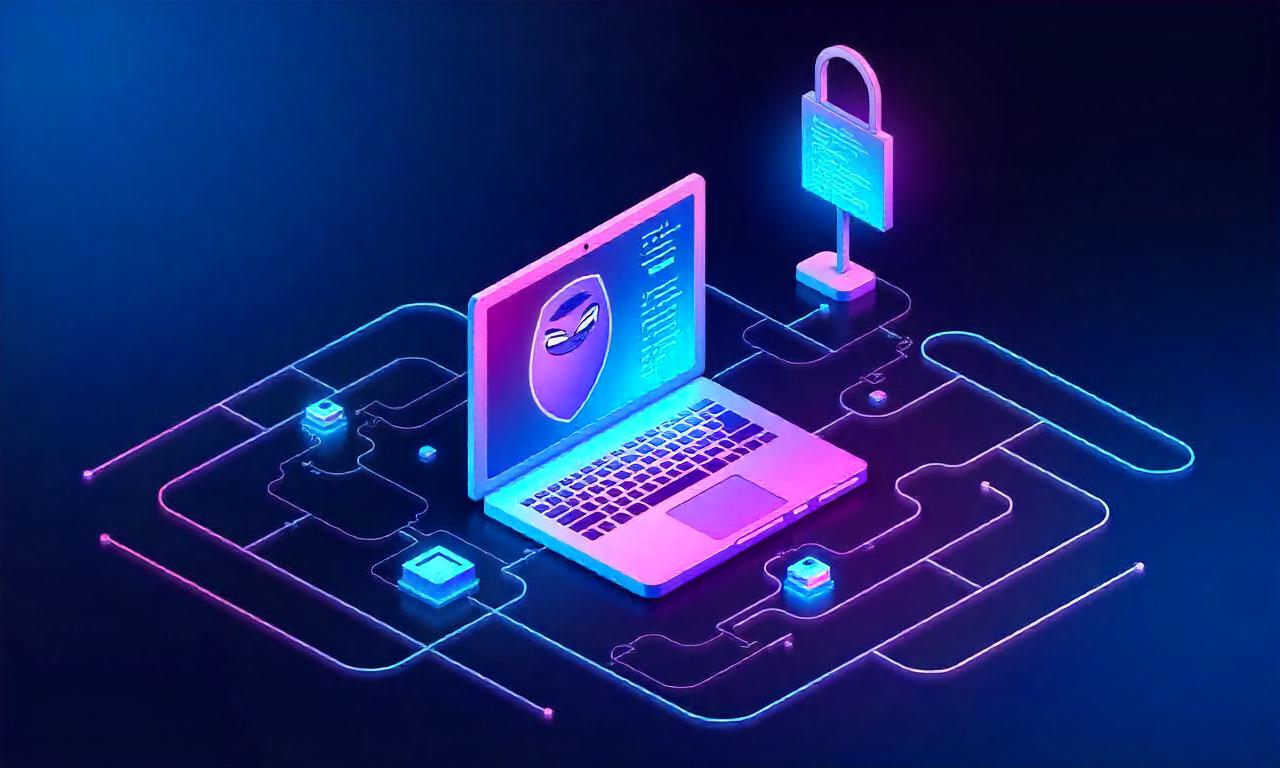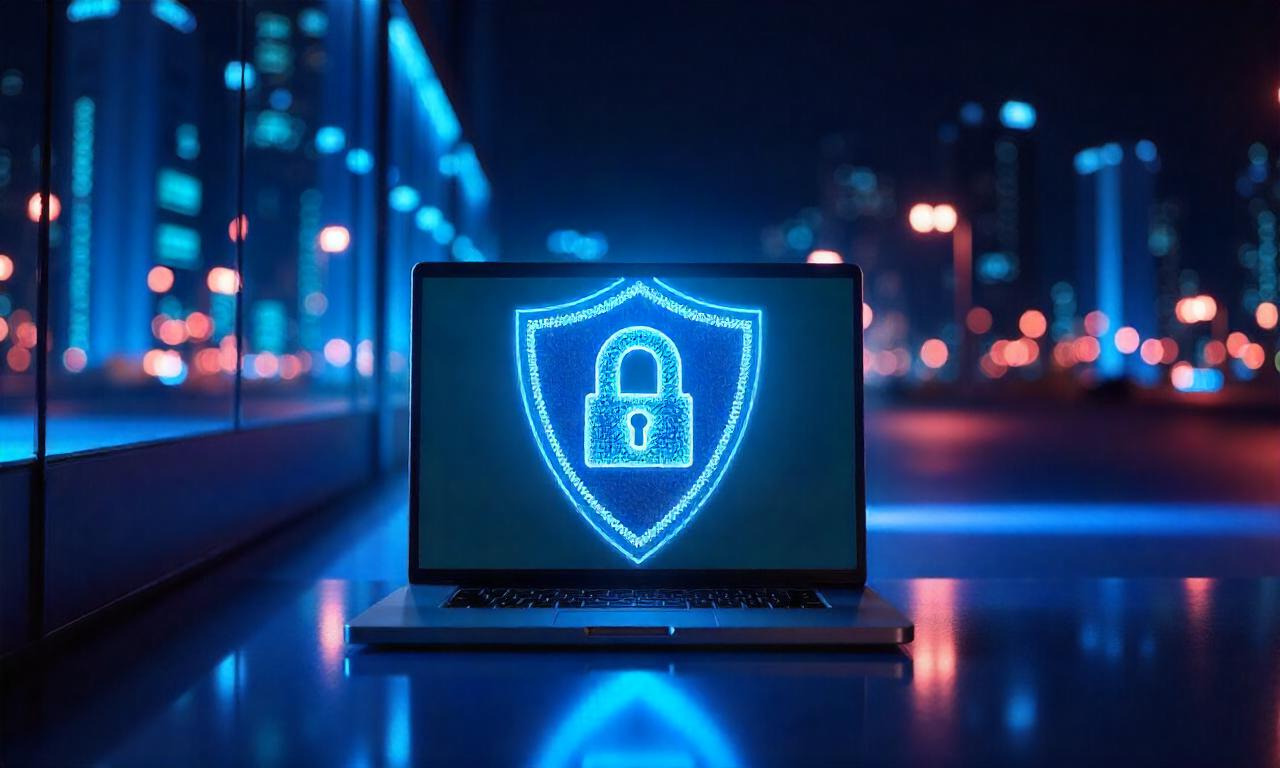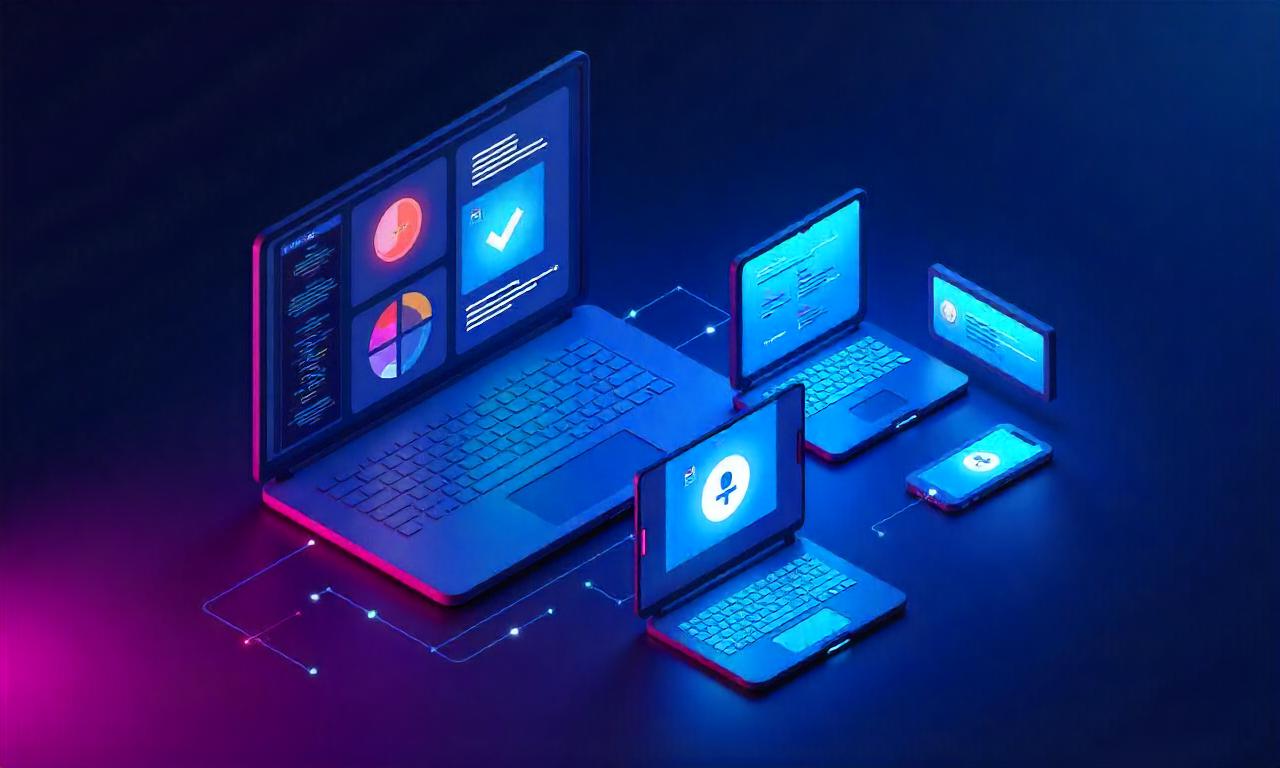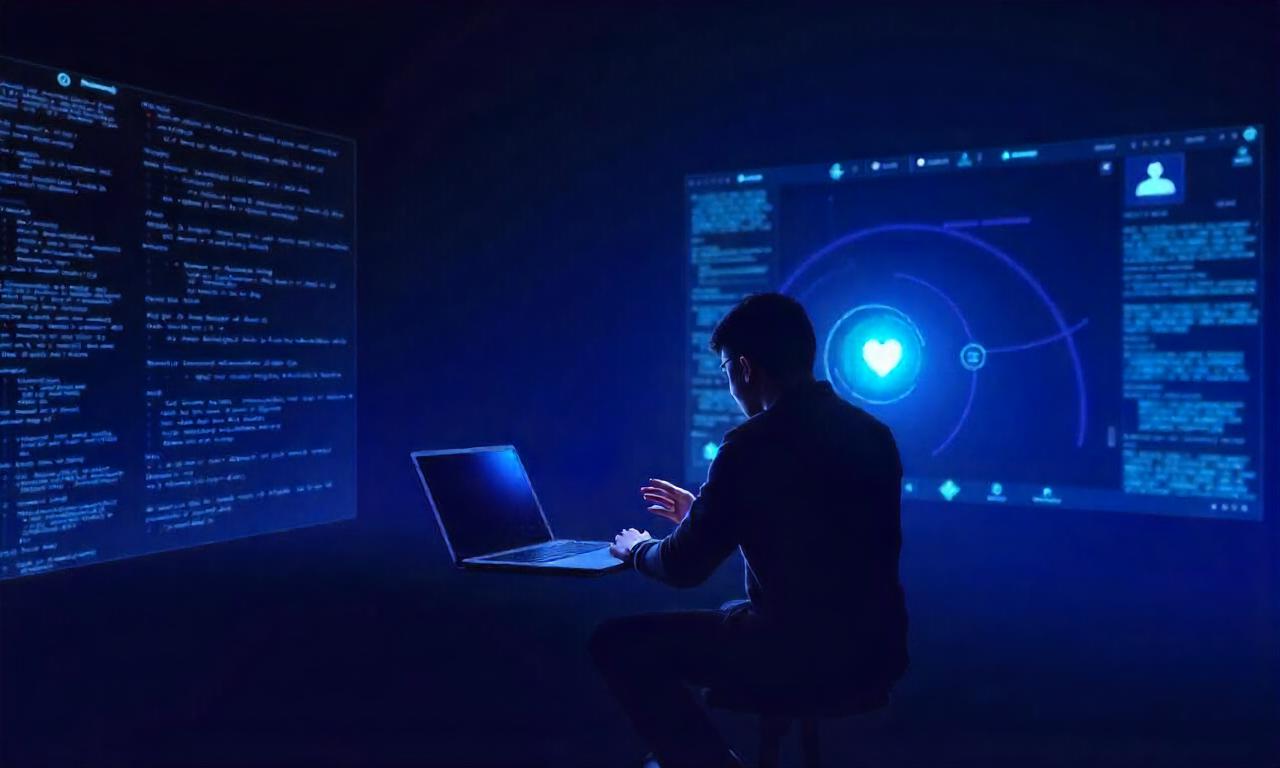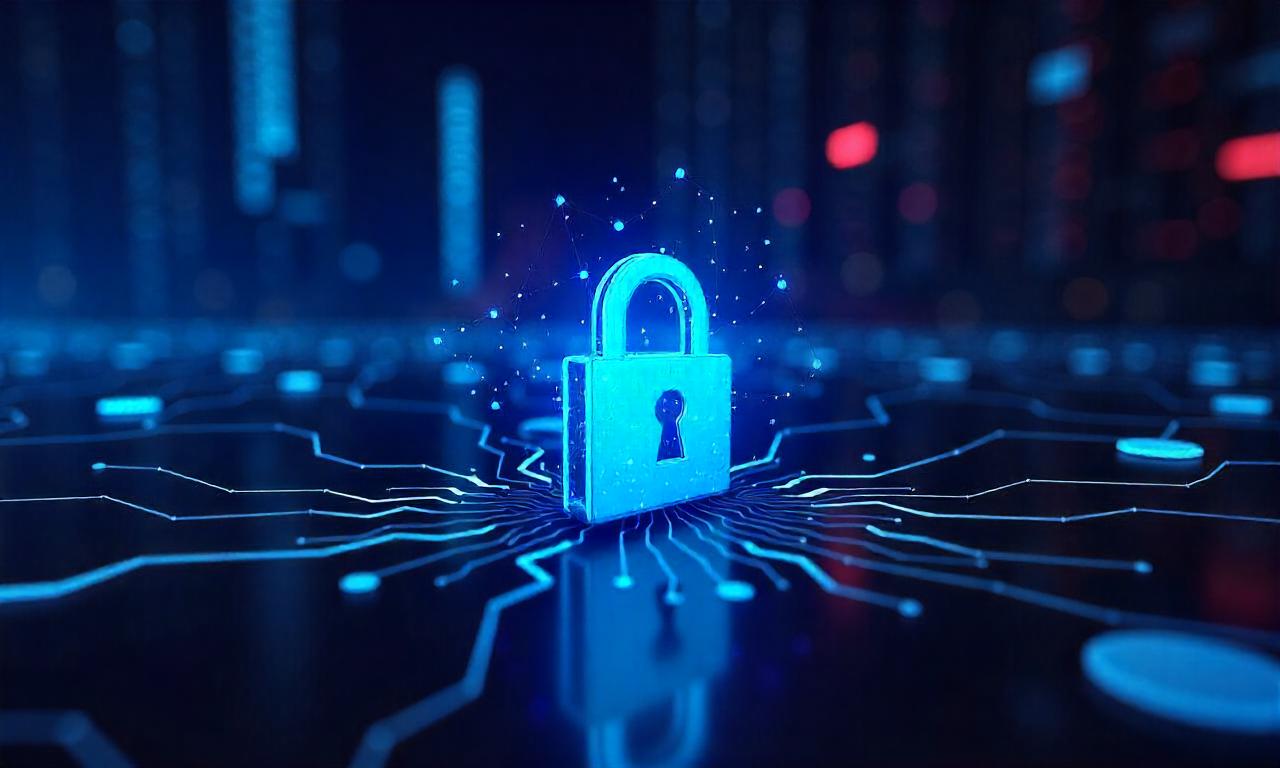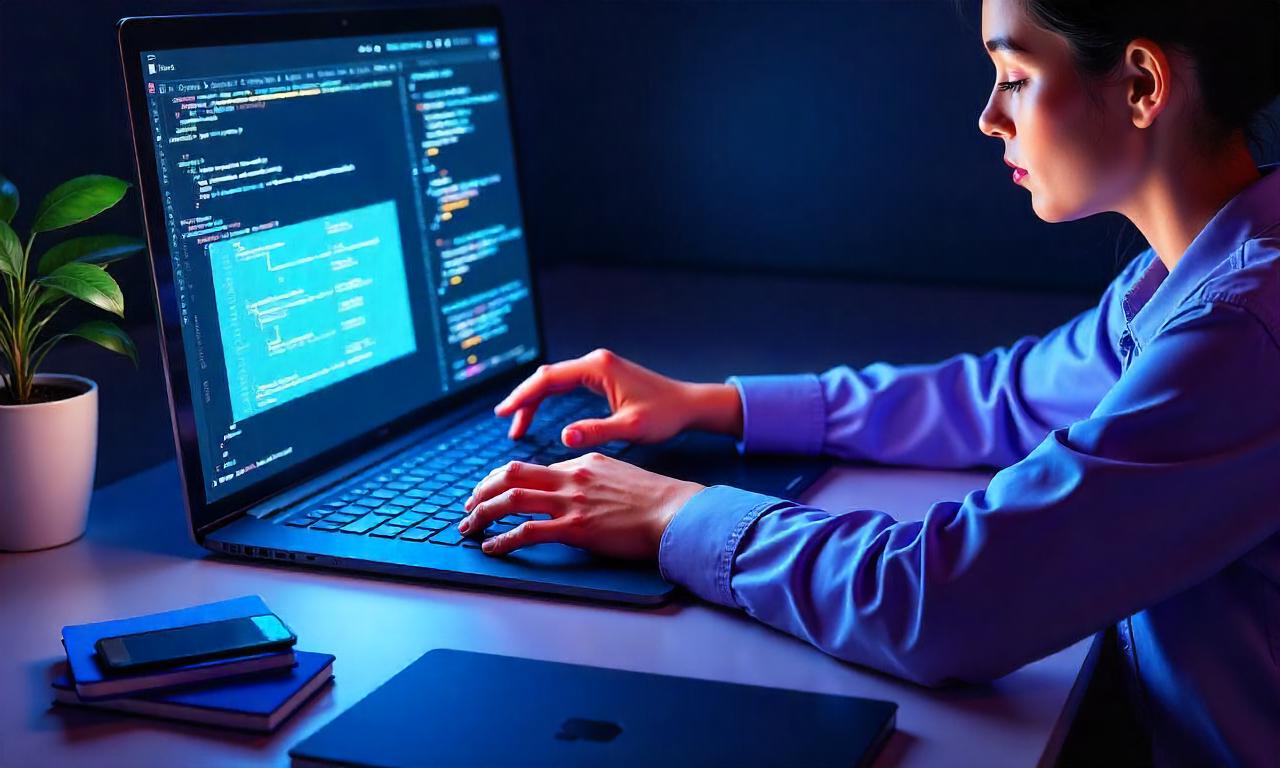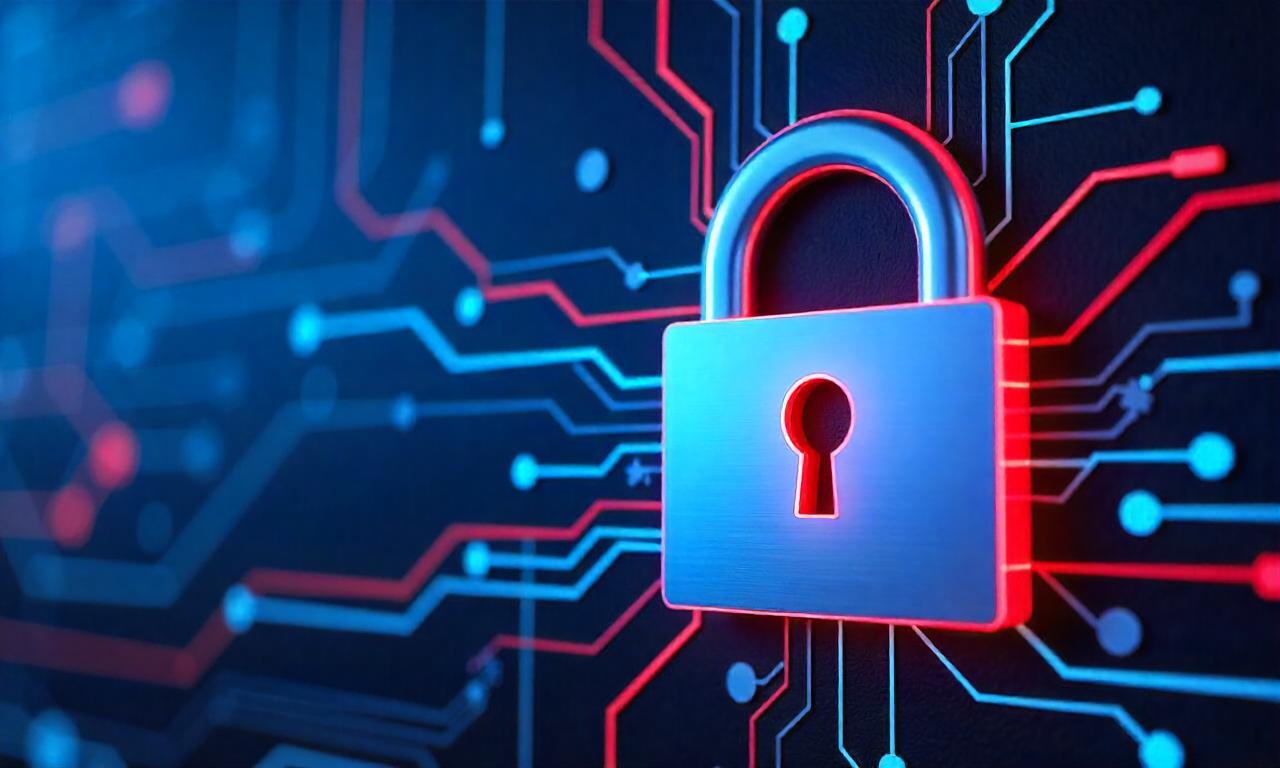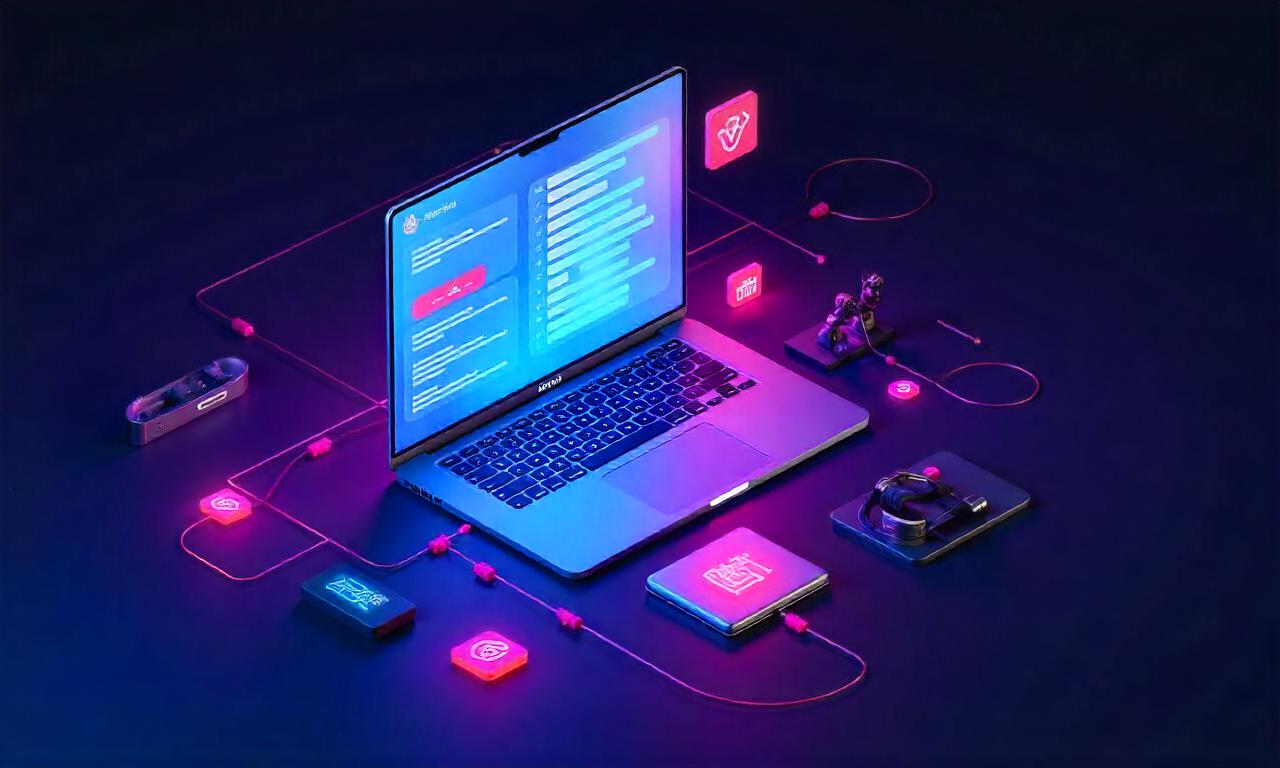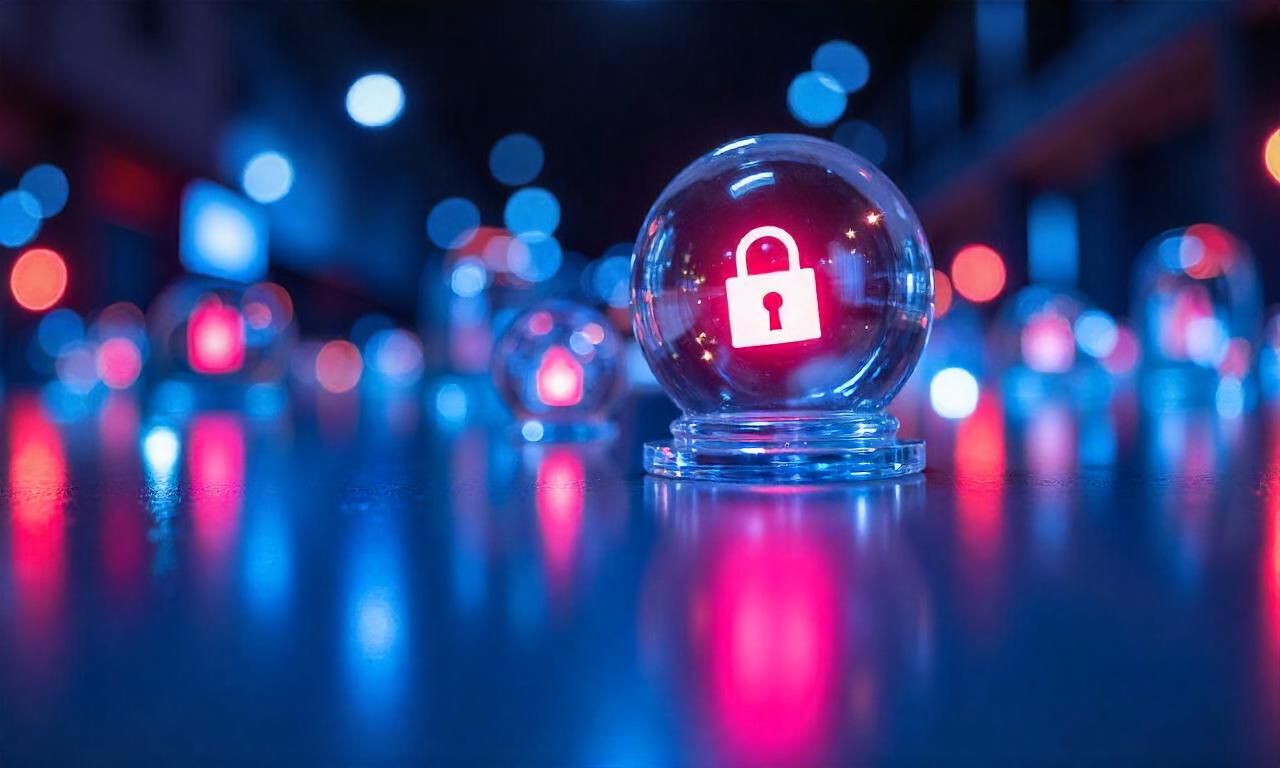Learn how to use a VPN from another country to access geo-restricted content, secure your data, and enjoy a safer online experience wherever you are.
Ever thought about accessing content blocked in your country or boosting your online security while traveling? Our VPN guide is here to help.
In today’s world, where online access is limited by where you are, a VPN can change everything. Let’s look at how these services can give you more privacy, security, and access to global content from home.
Table of Contents
ToggleKey Takeaways
- Understanding the importance of VPNs for secure browsing tips
- Learning how to access geo-restricted content effortlessly
- Exploring the benefits of enhanced online privacy and security
- Choosing the right VPN service tailored to your needs
- Setting up and connecting to a VPN server in another country
- Troubleshooting common issues encountered when using VPNs
Understanding What a VPN Is
A Virtual Private Network (VPN) is key for those worried about internet privacy and keeping their connection safe. Knowing how a VPN works helps protect online activities from unwanted eyes and cyber dangers.
Definition of VPN
A VPN, or virtual private network, creates a safe internet link. It hides your IP address with the VPN server’s, keeping your real IP secret. This protects internet privacy by stopping websites, advertisers, and governments from tracking you.
How VPNs Work
VPNs make a secure link between your device and the internet. Here’s how it works:
- You connect to the internet through the VPN’s server.
- The VPN encrypts your data, making it unreadable to anyone trying to get it.
- The VPN then hides your IP address with its own.
This keeps your data encrypted and your real IP hidden, offering strong internet privacy.
Understanding how a VPN works shows its value in boosting internet privacy and security online. This knowledge is vital when choosing the right VPN for personal or work needs.
Benefits of Using a VPN from Another Country
Using a VPN service has many benefits when you connect from another country. It helps us get past geo-blocks on streaming sites and websites. It also makes our internet use more private and secure.
Access Geo-Restricted Content
One big VPN advantage is getting to watch content blocked in your area. We can stream shows and movies from Netflix, Hulu, and BBC iPlayer, no matter where we are. By using a VPN server in the country where the content is available, it looks like we’re watching from there. This lets us enjoy lots of content we couldn’t see before.
Enhanced Online Privacy
Another key benefit of VPNs is better online privacy. They hide our IP addresses and encrypt our internet use, making us internet anonymous. This makes it hard for hackers, ISPs, and governments to track what we do online. Without a VPN, our online activities can be easily watched and collected, which is a big privacy risk.
Improved Security
VPNs also make our internet use safer. They encrypt our data, protecting us from cyber threats like data theft and attacks. Whether we’re on public Wi-Fi or checking sensitive info, a VPN keeps our connection safe. This gives us peace of mind.
Here’s a table showing the main benefits of using a VPN from another country:
| Benefit | Description |
|---|---|
| Bypass Geo-Blocks | Access content from any region by connecting to VPN servers in different countries. |
| Internet Anonymity | Keep browsing activities private by masking IP addresses and encrypting traffic. |
| Improved Security | Protect against data theft and cyber attacks through strong encryption. |
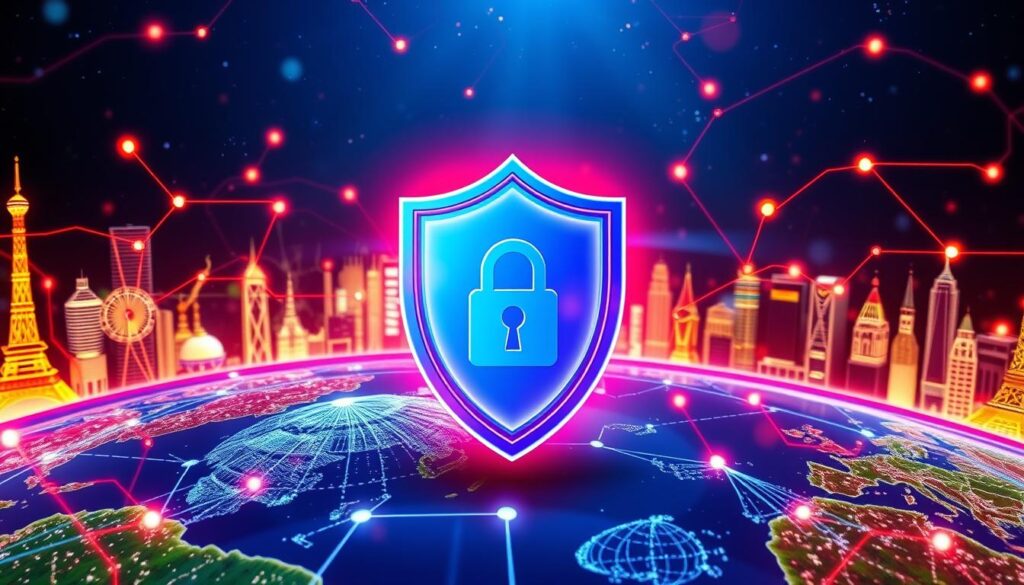
Choosing the Right VPN Service
Choosing the right VPN is important. You need to look at several key factors. It’s also important to know the differences between free and paid VPNs.
Features to Look For
When picking a VPN, focus on certain features. These include:
- Server Locations: Many server locations mean better access to content and faster speeds.
- Encryption Standards: Choose VPNs with strong encryption like OpenVPN or IKEv2 for data security.
- User-Friendliness: A simple interface and easy setup are key, even for non-techies.
- Speed and Bandwidth: Make sure the VPN doesn’t slow down your internet.
- Privacy Policies: Look for no-logs policies to keep your online activities private.
Top VPN Providers
Many top VPN services are available. Each has unique features. Some leading providers are:
| Provider | Key Features | Price |
|---|---|---|
| ExpressVPN | 3000+ servers, No-logs policy, Strong security | Starts at $8.32/month |
| NordVPN | 5400+ servers, Double encryption, CyberSec | Starts at $3.71/month |
| Surfshark | 3200+ servers, Unlimited devices, Ad-blocker | Starts at $2.49/month |
Free vs. Paid VPNs
Free VPNs are tempting because they’re free. But, they often have limits like bandwidth caps and fewer servers. They might also have weaker privacy.
Paid VPNs offer more. They have faster speeds, more servers, and better security. Spending money on a VPN can give you a safer and more reliable online experience.
Setting Up Your VPN
Setting up your VPN might seem hard, but we make it easy. We guide you through a few simple steps. This way, you can start using your VPN quickly and safely. Enjoy better online privacy and security.
Downloading the VPN Software
The first step is to download the VPN software for your device. Pick a trusted VPN provider that fits your needs. Then, go to their website to get the software.
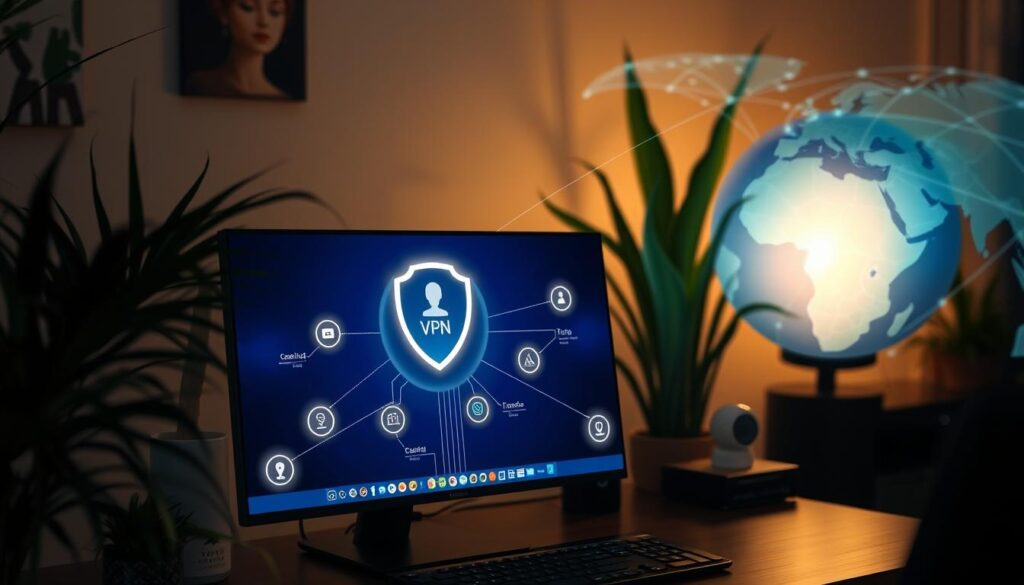
- Visit the official website of your chosen VPN provider.
- Navigate to the download section.
- Select the version of the software compatible with your operating system (Windows, macOS, Linux, Android, or iOS).
- Click the download button and wait for the download to complete.
Installing the VPN on Your Device
After downloading, you can start installing. The steps might change a bit based on your device:
- Open the downloaded file by double-clicking it.
- Follow the on-screen instructions provided by the installation wizard.
- Agree to the software’s terms and conditions.
- Select the destination folder for the installation if prompted.
- Complete the installation and launch the VPN application.
Configuring the VPN Settings
After installing, you need to set up the VPN. This ensures it works well and keeps you safe. Here’s how:
- Open the VPN application on your device.
- Log in using your credentials (username and password) provided by the VPN service.
- Navigate to the settings or preferences menu within the application.
- Adjust the security protocols (e.g., OpenVPN, L2TP/IPSec) as required.
- Enable features like a kill switch or ad blocker if available.
- Save your settings and ensure the VPN is ready to connect.
By following these steps, you’ve set up your VPN. You’ve installed and configured it. Now, you can enjoy the benefits of using a VPN.
Connecting to a VPN Server in Another Country
In this section, we’ll show you how to connect to a VPN server in another country. It’s important to pick the right server, make a secure VPN connection, and check your new IP address for the best results.
Selecting a Server Location
Choosing the right server location is key for a good VPN experience. Think about:
- The server’s distance from you for faster speeds.
- The server’s load to avoid lag.
- Specific needs like accessing content from a certain country.
Establishing a Connection
After picking a server, you need to make a reliable VPN connection:
- Open your VPN app.
- Pick the country from the server list.
- Click ‘Connect’.
Wait a bit for the VPN to connect. You’ll get a message when it’s done.
Verifying Your New IP Address
After connecting, check your new IP address to make sure you’re in the right place. This step confirms your VPN is working right:
- Go to an IP address check site like WhatIsMyIP.com.
- See if your IP address matches the server country.
| Steps | Description |
|---|---|
| Server Selection | Choose a server close to your location with low load. |
| VPN Connection | Establish a secure connection through your VPN software. |
| IP Address Verification | Verify that your IP address matches the country of your selected server. |
Testing Your VPN Connection
Testing your VPN connection is crucial. It ensures your VPN offers privacy, speed, and access to blocked content. Follow these steps for effective VPN testing:
- Check connection reliability: First, make sure your VPN connection is stable. A reliable connection means you’re always protected and can access websites without interruption.
- Perform a VPN speed test: Next, check if your VPN slows down your internet. Speed tests show if the VPN’s servers are fast enough for your activities, like streaming and gaming.
- Verify IP Address: Lastly, confirm your IP address matches the VPN server’s location. This ensures your online activity is routed through the VPN, not your real IP address.
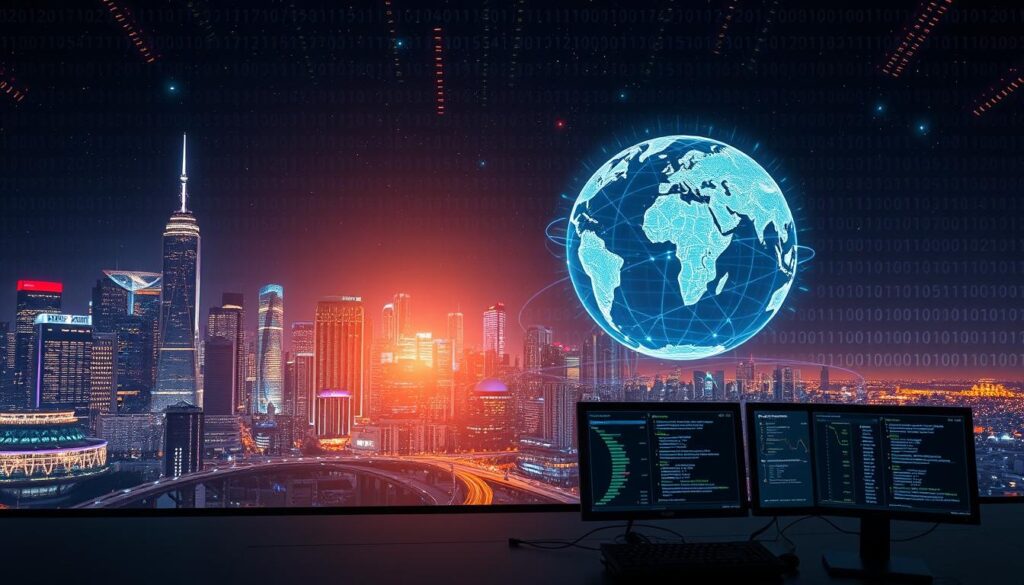
We’ve made a table to help you test your VPN. It compares popular tools for checking speed, reliability, and security:
| VPN Testing Tool | Features | Pros | Cons |
|---|---|---|---|
| Speedtest by Ookla | Measures internet speed and latency | Accurate, user-friendly interface | Ads in the free version |
| ExpressVPN Speed Test | In-app speed test for VPN connection | Integrated within the VPN app, no ads | Limited to ExpressVPN users |
| Pingdom | Server response time and uptime monitoring | Comprehensive monitoring tools | Requires a subscription |
| IPLeak | Checks for IP, DNS, and WebRTC leaks | Free to use, detailed information | Can be complex for beginners |
Using these tools and methods ensures your VPN works as expected. Regular testing keeps your connection fast and reliable.
Ensuring Your VPN is Secure
Keeping your VPN security strong is key to keeping your privacy safe and your data protected. A good VPN should have strong encryption, block DNS leaks, and follow a strict no-logs policy. This helps keep your data protection top-notch. Let’s dive into what makes a VPN secure.
- Encryption Standards: The best VPNs use AES-256 encryption to keep your data safe. This top-level encryption makes sure your encrypted communication stays private from others.
- DNS Leak Protection: A reliable VPN should have DNS leak protection. This stops your data from leaking outside the secure VPN tunnel. It keeps your VPN security consistent.
- No-Logs Policy: Choose a VPN that follows a strict no-logs policy. This means your online activities are not recorded. It boosts your data protection and privacy.
| Feature | Importance |
|---|---|
| Encryption | Ensures encrypted communication and protects data from interception. |
| DNS Leak Protection | Prevents data spills, maintaining continuous VPN security. |
| No-Logs Policy | Ensures complete data protection by not storing user activity logs. |
By knowing and using these security steps, we can better protect our online privacy and keep our personal info safe.
Troubleshooting Common VPN Issues
Using a VPN can sometimes be tricky. You might face issues like slow speeds or trouble accessing websites. Let’s look at some ways to fix these problems.
Connection Drops
Connection drops happen when your VPN suddenly stops working. This could be because of a shaky internet connection, too many users on the server, or wrong VPN settings. Here’s how to solve it:
- Make sure your internet connection is stable.
- Try a different VPN server.
- Update or adjust your VPN software.
Slow Internet Speed
Slow speeds while using a VPN are common. They might be caused by server problems, strong encryption, or too much traffic. To improve your speed:
- Choose a server that’s closer to you.
- Find a server with lower latency.
- Try a different VPN protocol if you can.
Unable to Access Certain Websites
Sometimes, you can’t get to certain websites or streaming services. This might be because of geo-blocks, VPN blacklists, or DNS leaks. Here’s how to fix it:
- Clear your browser’s cache and cookies.
- Try a different server in the country you want.
- Make sure your VPN has DNS leak protection on.
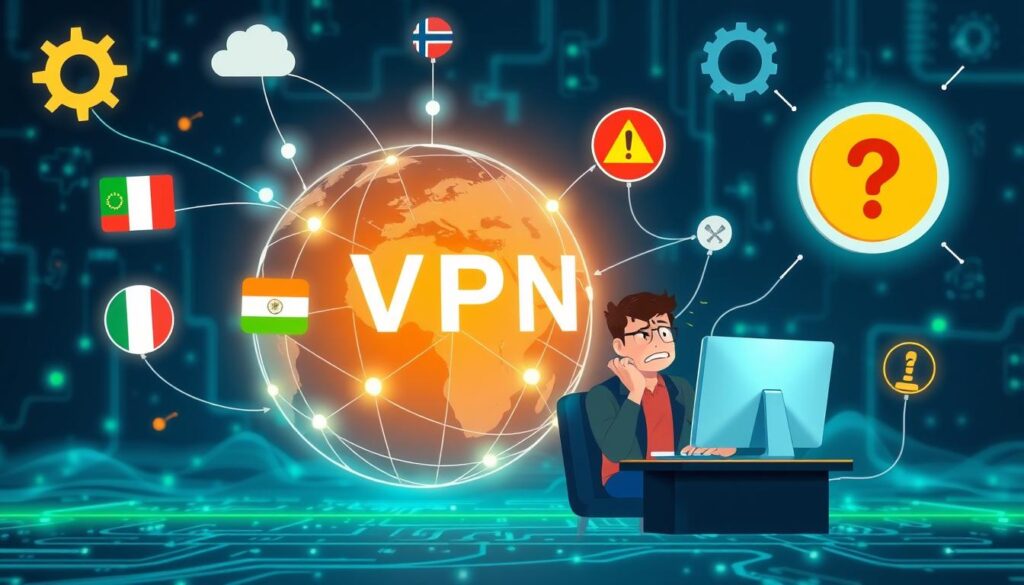
| Problem | Possible Cause | Solution |
|---|---|---|
| Connection Drops | Unstable Internet | Check Connection |
| Slow Internet Speed | Server Overload | Switch Servers |
| Unable to Access Websites | Geo-Blocks | Clear Cache |
How to Use a VPN from Another Country for Streaming
Streaming content from other countries is now easier with a VPN. It hides our real IP address and shows one from another place. This lets us explore a vast world of entertainment. Let’s explore how to get the most out of streaming with a VPN.
Accessing Popular Streaming Services
To unlock content on big streaming sites like Netflix, Hulu, or BBC iPlayer, picking the right VPN is key. Not all VPNs can get past the strong blocks these sites use. So, it’s vital to choose a VPN known for getting past these blocks.
| Streaming Service | VPN Compatibility | Key Benefits |
|---|---|---|
| Netflix | NordVPN, ExpressVPN | Access international libraries |
| Hulu | Surfshark, CyberGhost | Watch US-exclusive shows |
| BBC iPlayer | ExpressVPN, PrivateVPN | Stream UK content |
Best Practices for Streaming
For a smooth streaming experience, follow these tips:
- Pick a server close to the content provider to cut down on delay and boost speed.
- Ensure your internet is fast and steady. Wired connections are usually better than Wi-Fi.
- Keep your VPN software up to date for the latest speed boosts and new server spots.
- Think about using a VPN with special streaming servers for the best speeds.
By following these tips, we can enjoy streaming without interruptions and access content worldwide.
Using a VPN on Different Devices
Using a VPN on various devices is key for keeping your privacy and security safe. By setting it up on different devices, you can enjoy a safe and private online experience.
Setting Up VPN on Smartphones and Tablets
Mobile devices need a good multi-device VPN setup. For VPN for smartphones and tablets, it’s easy. First, download a trusted VPN app from the Apple App Store or Google Play Store. Then, follow the app’s instructions to turn on the VPN and set up your preferences.
It’s important to pick apps from reliable sources to keep your devices safe and working well.
Using VPN on Laptops and Desktops
Laptops and desktops need a bit more setup than mobile devices. Start by getting the VPN software from your provider’s website. Then, use the setup wizard to set up your VPN. This includes choosing a server, entering your login info, and picking extra security options.
Being careful with this setup is crucial for better online privacy and security.
Configuring VPN on Routers
For protecting all devices at home, setting up VPN on routers is a smart choice. First, log into your router’s admin panel and find the VPN settings. You’ll need to enter your VPN service’s server address and login details.
Once it’s set up, all devices on your Wi-Fi network will have VPN protection. This offers a complete solution for security and privacy for everyone at home.
Conclusion
As we conclude our guide, it’s clear that using a VPN from another country has many benefits. You can access content blocked in your area, keep your online activities private, and stay safe online. Our summary shows how picking the right VPN, setting it up right, and staying safe online are key to these benefits.
Choosing the right VPN is essential. Look at server locations, speed, security, and support. Top VPNs like ExpressVPN, NordVPN, and CyberGhost offer great service, whether you choose free or paid options. Our guide helps you download, install, and set up your VPN to connect to a server abroad.
In our final thoughts, we stress the importance of checking your new IP address and testing your connection. Troubleshooting common issues ensures a smooth and secure browsing experience.
Using a VPN makes the internet safer and opens up a world of unrestricted online access. We encourage you to use your VPN to the fullest and enjoy a safer, freer digital life.
Want to unlock global content? Visit vpnpieces.com for expert tips on how to use a VPN from another country and enhance your browsing freedom today!
FAQ
What is a VPN?
A VPN, or Virtual Private Network, creates a secure internet connection. It hides your IP address. This lets you browse privately and access content blocked in some countries.
How does a VPN work?
A VPN routes your internet through a remote server. This encrypts your data and hides your IP. It replaces it with the VPN server’s IP.
Why should I use a VPN from another country?
A VPN from another country lets you bypass geo-restrictions. You can access content only available in certain areas. It also protects your privacy by hiding your location.
How do I choose the right VPN service?
Look for server locations, encryption, speed, ease of use, and customer support. Top choices include NordVPN, ExpressVPN, and CyberGhost.
What are the differences between free and paid VPNs?
Free VPNs have slower speeds, fewer servers, and less security. Paid VPNs offer better performance, more features, and higher security. They’re better for regular use.
How do I set up a VPN on my device?
Download and install the VPN software. Then, follow the provider’s setup guide. Many VPNs have detailed guides for different devices.
How do I connect to a VPN server in another country?
Open your VPN app, pick a country, and connect. Check your new IP address to make sure it matches the country.
How can I test my VPN connection?
Check if your IP address has changed. Also, test speeds and access geo-restricted content. This confirms your VPN is working right.
What should I do if my VPN connection drops?
First, check your internet and restart the VPN app. Try a different server. If problems continue, contact the VPN’s support for help.
How can I use a VPN for streaming?
Connect to a server in the country where the content is available. Choose a VPN with fast streaming speeds. This way, you can watch Netflix, Hulu, and BBC iPlayer.
Can I use a VPN on multiple devices?
Yes, most VPNs support multiple devices. They work on smartphones, tablets, laptops, and desktops. Some even offer router setup guides for all device protection.

